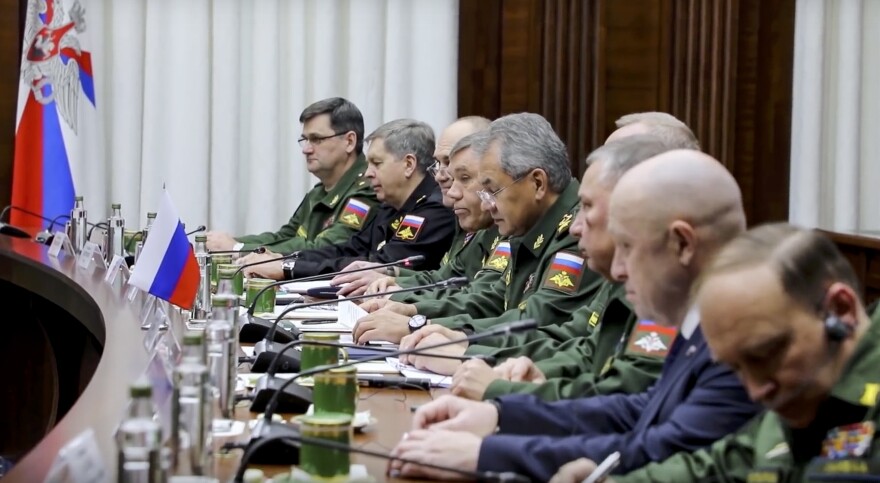In 2006, Russian President Vladimir Putin hosted a dinner for President George W. Bush and other world leaders in St. Petersburg, Russia. In a photo, the man standing behind them is the caterer, wearing a tux and a white bow tie. His name is Yevgeny Prigozhin.
His nickname is "Putin's chef." So what's the big deal about him?
"He epitomizes a real renaissance man in contemporary Russia, which is to say that he runs some very high-end restaurants," said Angela Stent, the head of Russian Studies at Georgetown University and author of the forthcoming book Putin's World.
Interesting. But what else does he do?
"He was the one running this Internet Research Agency, this troll factory in St. Petersburg that managed to mobilize thousands of Americans from 5,000 miles away to demonstrate and protest in the 2016 election," said Stent.
That gets your attention. And there's more.

"He also runs Wagner, one of the largest mercenary private military groups in Russia," she added. "His troops are in Syria, they're in Ukraine, they're in a number of other places, where they are fighting in the Russian state's interest."
So he's got a lot cooking.
Tracking the key figures around Putin, and how they fit into the Russia investigation in this country, can be confusing.
Yet Prigozhin's name is worth knowing. He's burly and bald, at age 57. And while his name keeps cropping up, he's largely invisible — even in Russia.
"He doesn't have much of a public persona in Russia. Until very recently he was virtually unknown," said Dimitri Simes, who heads the Center for the National Interest, a think tank in Washington, D.C. "This is not a person who speaks at important political or business meetings. This is not a person who regularly appears on TV."
So where did Prigozhin come from?
He spent most of his 20s in prison on robbery, fraud and prostitution convictions. In the 1990s, he rebuilt his life with hotdog stands, which evolved into a catering business in St. Petersburg, Putin's hometown.
"He proceeded to get a big break catering high-profile events, one with Vladimir Putin and French President Jacques Chirac in 2001," said Michael Kofman, who closely follows Russia for the U.S. government-funded research organization CNA. "Eventually, he got a massive contract for feeding the Russian military and the Russian armed forces, which is probably where most of his money comes from."
At a recent press conference, Putin was dismissive when asked about his putative chef.
"All my chefs are employed by the Federal Guard Service. They are all servicemen holding different ranks. I have no other chefs," Putin said.
Regarding the private military company, Putin added: "If they comply with Russian laws, they have every right to work and promote their business interests anywhere in the world."
Those interests extend to Syria. In a dramatic confrontation last year, Russian mercenaries tried to seize an oil facility that was held by the U.S military and its allies.
As it was unfolding, former Defense Secretary Jim Mattis said he wanted to find out who the attackers were and make sure they weren't part of the formal Russian army. The U.S. military contacted their Russian counterparts on a "deconfliction" hotline the two sides use to make sure they didn't shoot at each other in Syria.
"The Russia High Command in Syria assured us it was not their people," Mattis told Congress last year.
Once that was cleared up, Mattis said, "My direction was for the force to be annihilated."
And it was. The Americans say more than 200 Russian mercenaries were killed in withering airstrikes before they retreated from the one-sided fight near the eastern city of Deir el-Zour.

"They are hired mercenaries who fight for money," Kofman said of the Wagner fighters. He said the mercenaries are allowed to keep a percentage of what they capture, and that's why they targeted the oil facility.
"They thought they'd take it and the thing turned out to be a fiasco," he said.
Kofman and other analysts see Prigozhin as the man funding these ventures, though he may not be involved in the details. In addition, it's not clear how much guidance the Kremlin provides, but it may be limited to some general guidelines, according to analysts.
Simes, meanwhile, notes that many rich businessmen in Putin's orbit are often described as "oligarchs." He disagrees with this label, saying it suggests they have real political power, which they don't in Putin's Russia.
He describes the Putin-Prigozhin ties as "not a relationship of co-equals, not a relationship of two intimate friends, but somebody who knows Putin reasonably well, who benefited from that relationship and who is prepared to be of help when needed."
Because Prigozhin and others like him are not formally part of the government, the Kremlin can distance itself and deny they are acting on behalf of the Russian state.
However, the U.S. government has shown a strong interest in Prigozhin.
The Treasury Department sanctioned him in 2016 for supporting Russia's military occupation in Ukraine.
Robert Mueller's team indicted him last February, saying he used his catering company to fund the Internet Research Agency, which interfered in the 2016 election.
There's virtually no record of Prigozhin speaking publicly. But he did comment on the indictment, telling Russia's state-run Ria Novosti news agency, "Americans are very impressionable people. They see what they want to see. If they want to see the devil — let them see one."
There was a rare sighting in November, when a Libyan military delegation met their Russian counterparts in Moscow. A video of the meeting shows everyone in a military uniform — except one Russian, who's conspicuously wearing a business suit. The man is Yevgeny Prigozhin.
And in the latest twist, Reuters reports that hundreds of Russian mercenaries are now in Venezuela supporting Nicolás Maduro, the embattled president. The Kremlim denies this.
Greg Myre is a national security correspondent. Follow him @gregmyre1.
Copyright 2021 NPR. To see more, visit https://www.npr.org.




